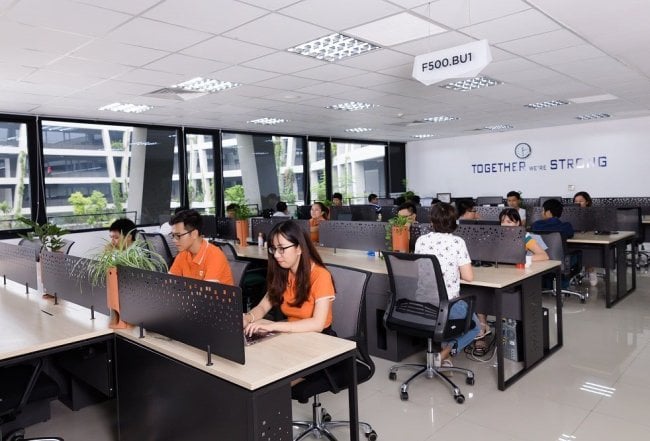Vietnam faces shortage of IT workforce
The shortfall comes from mismatching programmer skills and business needs.
Information technology (IT) professionals in Vietnam are increasingly sought after with high salaries, but the country is facing a serious shortage of IT workers.
According to a survey conducted by TopDev, a leading IT recruitment platform in Vietnam, IT software engineer is one of the top three positions sought by companies. However, it is also a difficult position to recruit, although the salary is quite attractive.
TopDev said that a programmer’s salary in Vietnam currently ranges from US$350 per month (for fresh graduates) to $1,190 per month for intermediate positions. Senior programmers have salaries ranging from $860/month to $1,510/month. Managers (from 5 years of experience or more) can earn from $1,410/month to more than $2,300/month.
An IT class at FPT University Hanoi. Photo courtesy of the university |
However, only about 16,500 students, or about 35% of the total 55,000 students majoring in IT, meet the skills and requirements of businesses. As a result, it is predicted that there could be a shortage of up to 800,000 programmers by 2024, TopDev said, stressing that this shortfall is due to the mismatch between programmer skills and business needs.
"In addition, the current market is not only limited by national borders but also by the trend of digital transformation in enterprises, which leads to a higher need to recruit human resources with IT majors," said Truong Nhu, CEO of TopDev.
"Under the influence of Covid-19, as remote working became more commonplace, many companies in the US, Singapore, and Europe began to recruit highly skilled personnel from Vietnam, allowing them to work locally and receive international salaries," Nhu added.
The CEO also noted that Vietnam's current digital infrastructure gives the country a competitive advantage. Vietnam is among the top 12 countries in the world with the cheapest Internet charges, at about US$11.27 per month per subscriber. This low price and widespread accessibility make Internet use common throughout the country.
Corporations in Hanoi thirst for IT human resources amid digital transformation period
Statistics from FPT University Hanoi show that the demand for IT human resources increases, but the labor market in Hanoi is always in a shortage in both quantity and quality.
A preliminary assessment by the Hanoi Department of Labor, Invalids and Social Affairs showed that the recruitment of workers by IT enterprises after the Covid-19 pandemic tends to increase sharply. Currently, more than 20 large IT companies and enterprises in the capital are in need of human resources.
The Hanoi Job Service Center's recruitment demand survey at the end of January showed that the IT-telecom industry led the recruitment demand with more than 1,000 positions. The center's Deputy Director Vu Quang Thanh said the missing positions are programmers, IT engineers, design staff, and technical staff.
"In the past, IT companies often recruited male engineers. Recently, the demand for recruiting male and female workers is similar. This shows that due to the shortage of human resources, and competition in terms of personnel, gender equality is achieved. The main requirement for candidates is the satisfaction of qualifications and adaptability to each specific job," Thanh added.
IT human resources play an important role in the digital transformation process, especially since the Covid-19 epidemic, enterprises have had to invest in technology platforms, and the demand for human resources in this industry has never cooled down.











